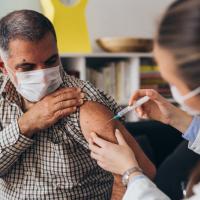2023 NIH Research Highlights - Human Health Advances
December 21, 2023
2023 NIH Research Highlights - Human Health Advances
Disease Prevention, Diagnosis and Treatment
With NIH support, scientists across the United States and around the world conduct wide-ranging research to discover ways to enhance health, lengthen life and reduce illness and disability. Groundbreaking NIH-funded research often receives top scientific honors. In 2023, these honors included two NIH-supported scientists who received Nobel Prizes. Here’s just a small sample of the NIH-supported research accomplishments in 2023. Also see this year's Promising Medical Findings and Basic Research Insights.
Printer-friendly version of full 2023 NIH Research Highlights







